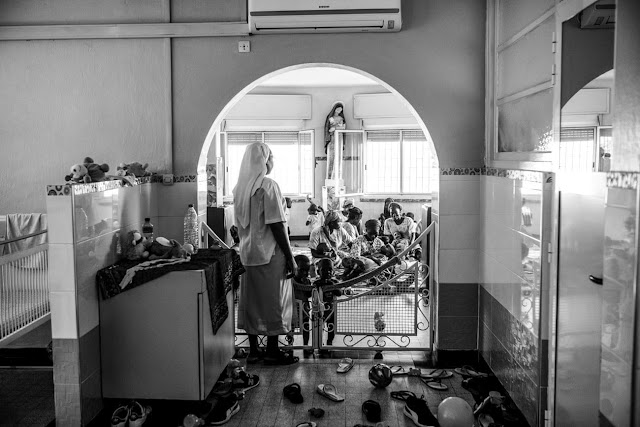Victims of society and ignorance or common killers. The answer for these Senegalese women is not simple
Bebeus is one of the largest landfills in all of Africa with thousands of crayfish collectors searching through the rubbish to find something they can sell. At the same time, however, it is the largest children’s cemetery in Senegal. In the last three years alone, the dead bodies of 32 babies have been found in the rubbish. It is unknown how many babies have not been found…
Senegal has been facing a high infant mortality rate in recent years. Young women become pregnant out of wedlock and because of the stigma this brings to Senegalese society they decide to get rid of the problem even late. Without access in most cases to abortion clinics, these girls are forced to give birth and then choose to kill the newborn with their own hands.
Photographer Maroussia Bage was in Senegal and met mothers who killed their children creating a revealing report for the Guardian. According to her, behind this “scourge” seems to be the shame of pregnancy out of wedlock, which is strong in Senegalese society, but also the loss of traditional guidance and help that used to exist for young girls. He says many of the women he spoke to feel marginalized because of religious conservatism, financial hardship and lack of access to contraception and the absence of any sex education.
The tradition of “Bandiane”
In the old days, young girls could turn to “Bandiane”, their older aunt, who would teach them about sex and contraception as they approached puberty.
According to Senegalese tradition, “la Badiane” holds an important place in every family. However, this tradition is lost as the years go by. “Bandiane” was the one who provided sexual education to the girls. He was also the only person allowed to watch the initiation of girls into women in the “sacred forest”.
The “Le Bois Sacré”, or sacred forest, was at the center of a ceremony for boys and girls who reached adolescence. The girls in particular, under the guidance of Bandiane, went to the sacred forest for up to three months. There they took part in ceremonies and learned about menstruation and sexuality as well as alternative methods of contraception. However, due to rapid modernization and urbanization, this tradition has virtually disappeared. It is characteristic that the last such mass ceremony took place in 1968!
Along with the loss of tradition came the degradation of the role and position of women in society, something that had drastic consequences in the lives of girls. The older generations knew the traditional methods of contraception and abortion, something that has not been passed on to the younger generations. Many of the women Bayeux spoke to said they felt abandoned by their elders as their mothers and grandmothers no longer passed this information on to them. With classic contraception being very expensive and abortion only allowed when a woman’s life is in danger, there is no other solution in the minds of these girls.
Bage talking to some of the women who have been jailed for killing their babies and photographing the work done by the NGO Tostan, which aims to train as many women as possible in an art to make a living when they are released, argues that it is obvious that the abandonment of this tradition has greatly affected the situation. For these women there is no support from the family but also no psychological help or a man just to talk to him.
“Here, having a child out of wedlock is very serious and society treats it very badly. “Women in this situation prefer to drown their child rather than experience this pressure from society,” said Imam Bayeh Niang, a spokeswoman for the Senegalese National Assembly.
At the same time, many of the women convicted of infanticide say they had no idea they could leave their baby at the Pouponnière orphanage in Dakar, one of Senegal’s few institutions.
The Pouponnière orphanage in Dakar is run by Catholic nuns. It was founded in 1955 to help already full hospitals and care for abandoned or orphaned babies. In its course it has cared for 4,150 infants of which 3,496 were orphans, 504 were adopted or are in the process of adoption and 104 died. Today, the Pouponnière cares for about 86 children each year. However, in rural Senegal few women are aware of the existence of this or that orphanage.
- Brutal crime: Rich young man beheads diplomat daughter
- US First Lady enters surgery
- True story: A father stormed the hospital with a gun and rescued his dying son [VIDEO]
Everyday stories
Fatima (pseudonym) is 40 years old. She served a five-year sentence for the murder of her newborn daughter, and her story resembles that of many other women. In the small, religious community where she lived on an island in the south of the mainland she fell in love when she was 18 and became pregnant while single. Despite the social pressure and the stigma, she decided to keep the child, a little boy. She never met her son’s father again, who was a sailor. According to her, both she and her son received racism from the community on a daily basis.
Fatima was forced to marry a much older man and had four more children. But at one point she demanded a divorce, a taboo subject in her family. She was evicted from her home and taken away by her children. She went to the country’s capital, Dakar, and found work as a maid. At one point she sought the help of the local religious leader, Marabut, to win her family’s forgiveness. But he raped her and left her pregnant. Fatima did not want this child to live as a complete child and tried in vain to find a solution. However, abortion was not an option as she had neither the means nor the proper connections to do it secretly. She gave birth one day in a narrow dirty alley. For three days she hid her daughter from her employers before finally drowning her.
In Dakar she met a man and became pregnant again. He does not know how to write or read and earn less than one euro a day by selling what he can. Fearing for her own life and that of her child, she hid the pregnancy and when the child was born she threw it away. Today she lives hidden from society in a forest and with the help of Tostan she makes juices and grows chickens.
On the other hand, Mariamma (pseudonym) is 42 years old and has seven children. She was released from prison a year ago after serving a five-year sentence for killing her daughter. When she became pregnant she was widowed and saw a man with whom she was not married. She hid the pregnancy from her family, friends and colleagues at work. She says she killed her daughter while she was a newborn, but breastfed her for about an hour after giving birth. The necropsy of the child showed that she had strangled him before burying him in her garden with the help of her partner. Neighbors realized what had happened and called the police, who arrested her the next day. Now, as she says, she regrets what she did and warns her daughters about men and their bad intentions.
Two sides
Simple killers and even newborn babies or victims of society? It is difficult to give a final answer. Certainly our actions are ours and we are responsible for them. But at the same time, what is the responsibility of the society or the family that has created the whole person we become when we grow up? As is often the case, there are two sides to the issue.



